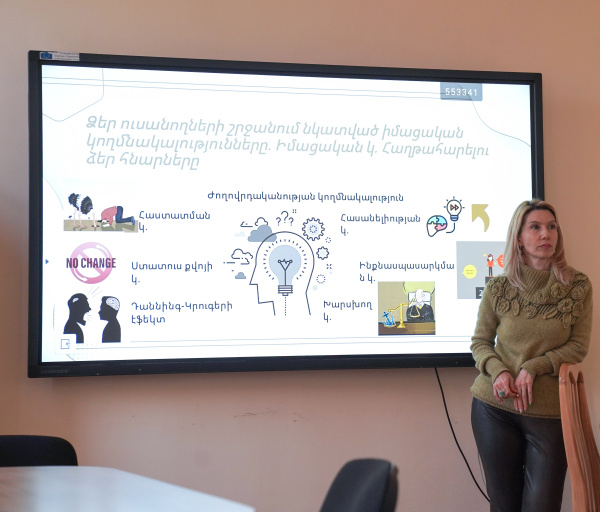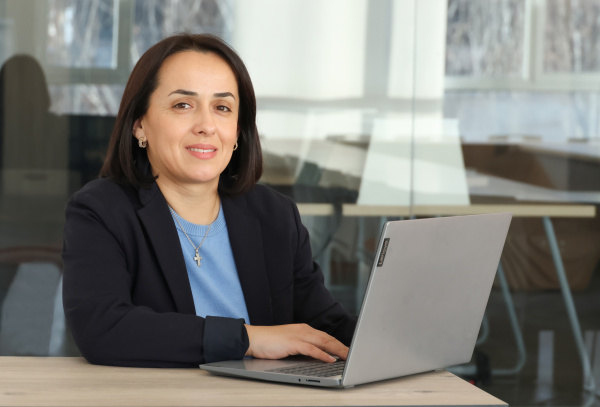December 24, 2024 | 11:00
Science
Education
Student life
New opportunities for developing critical thinking and media literacy skills at YSU
Yerevan State University places a strong emphasis on developing students' critical thinking and media literacy, combining the demands of contemporary education with international best practices. To achieve this, the university offers interdisciplinary courses designed to deepen knowledge and enhance skills in these key areas.

The "Critical Thinking" course, organized by the initiative of YSU Continuing Education Center, is tailored for lecturers and administrative staff, and the "Media Studies" course is designed for students.
New Approaches Aimed at Developing Critical Thinking

The "Critical Thinking" course was developed by Serob Khachatryan, Professor at the Chair of History, Theory, and Logic of Philosophy at YSU Faculty of Philosophy and Psychology, and Lilit Sargsyan, Associate Professor at the Chair of English Language No. 2 at the Faculty of European Languages and Communication. Together, they designed innovative approaches aimed at fostering the development of critical thinking.
Numerous studies conducted in Armenia and around the world show that critical thinking is a vital skill for advancement in all professional fields.
Lilit Sargsyan, highlighting the importance of critical thinking, points out that the growth of artificial intelligence and the speed of information flow further underscore the need for critical thinking.
"In today's world, where the volume of information often exceeds an individual’s ability to process it, critical thinking is essential. It enables deep analysis and evaluation of information, helping to distinguish facts from assumptions, identify flawed logic, and detect manipulation. This skill also plays a key role in effective problem-solving, strategic decision-making, and generating innovative ideas based on accurate, verified information. It fosters a sense of independence and responsibility, contributing to success both individually and in group settings," she emphasizes.
Media Literacy: An Important Tool for Effectively Addressing Information Challenges
Media literacy is an important component of modern education, enabling students to navigate the flow of information. The main objectives of the course are to familiarize students with the characteristics of the information age, develop skills for assessing the reliability of information and preventing manipulations, and teach the use of fact-checking tools. The course structure includes both theoretical and practical components. In the theoretical part, students explore key challenges in the media sphere, learn how to analyze information sources, and study methods for identifying media manipulation techniques.

Zaruhi Sargsyan, Associate Professor at the Chair of New Media and Communication, is one of the course instructors. She emphasizes that media literacy is an important tool for effectively addressing today’s technological and informational challenges. The specialist emphasizes that this course helps students become more discerning media consumers, enabling them to distinguish facts from assumptions and critically evaluate information sources.
Under the guidance of Garik Harutyunyan, a lecturer at YSU Faculty of Journalism, students gain skills in using fact-checking tools in the practical part of the course. Each student has the opportunity to test and evaluate the reliability of information through computer-based exercises. This course not only helps develop the ability to navigate media flows but also fosters independence and responsibility.
Leveraging the Professional Expertise of Specialists in the Field to Enhance the Course's Effectiveness
The development of the "Media Literacy" course was made possible through collaboration between different faculties, combining the expertise of specialists from the faculties of Journalism, Sociology, Philosophy and Psychology. Specialists from the Faculty of Journalism address the specifics of media influence, those from the Faculty of Philosophy and Psychology focus on the structural and psychological aspects of thinking, and experts from the Faculty of Sociology present the social impacts of information.
This collaboration provides students with the diverse knowledge necessary to function effectively in the modern media environment.
The "Critical Thinking" and "Media Literacy" courses not only foster students' intellectual growth but also protect them from information manipulation. These skills are essential for enhancing the quality of public life, remaining competitive in professional fields, and making the right decisions amid information noise.
YSU is committed to continuously enhancing its educational programs to meet modern demands. The "Critical Thinking" and "Media Literacy" courses are designed to strengthen students' preparedness, making them more informed, reliable, and ready to tackle the challenges of the information society.

